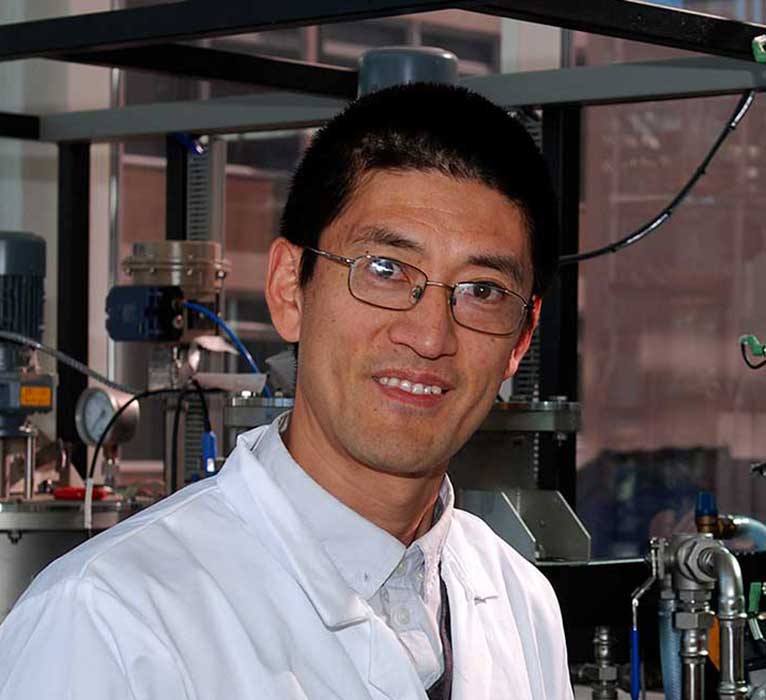Seawater fuel discovery reduces demands on freshwater use
Researchers from the University of Huddersfield have discovered that the use of seawater in the production of renewable energy source bioethanol significantly reduces its water footprint.
The study† - published in the journal Scientific Reports - investigates how a strain of marine yeast can be used with seawater and a substrate, such as maize or sugar, for a fermentation process that produces bioethanol.
Current methods can have a water footprint of more than 1,000 litres of fresh water to produce a single litre of the fuel. Fresh water remains a precious resource in many parts of the world.
The research team of Dr Chenyu Du and Dr Abdelrahman Zaky conducted the initial experimental work at Nottingham University. Further analysis was then carried out at the University of Huddersfield, after Dr Du had taken up his post at the University and where Dr Zaky completed his PhD, titled Utilisation of novel marine yeast and seawater-based media for the production of bioethanol.
Climate-friendly fuel alternative
In the fight against global warming, bioethanol fuel is seen as a climate-friendly alternative to petrol and its adoption has been encouraged by many governments.
The research demonstrates that seawater can substitute freshwater for bioethanol production without compromising production efficiency and that marine yeast is a potential candidate for use in the bioethanol industry, especially when using seawater or high salt-based fermentation media.
“The main purpose of marine fermentation is to introduce an alternative source of water and biomass for industrial biotechnology in order to reduce pressure on use of freshwater and arable land, allowing these resources to be dedicated to production of food and feeds and reducing production costs,” said Dr Du.
Dr Du and his team liken the quest for finding the marine yeast best suited to the process to prospecting for gold. The marine yeast strain ‘Saccharomyces cerevisiae AZ65’ yielded the best results.
From this research, bioethanol plants could now adopt the use of this marine yeast, which has demonstrated high inhibitor tolerance, to produce a high concentration of ethanol.
Next phase
The team are investigating methods to improve efficiencies and increase profitability within the bioethanol production process.
The next step in the research is to develop the use of a marine substance – such as seaweed – as an alternative to the likes of maize or sugar cane in the bio-refining process.
“This would mean we were able to produce bioethanol fully from the marine environment,” Dr Du explained. This approach is described in a paper published in Current Opinion in Green and Sustainable Chemistry.
†The article The establishment of a marine focused biorefinery for bioethanol production using seawater and a novel marine yeast strain is in the journal, Scientific Reports.
Bioethanol fuel is seen as a climate-friendly alternative to petrol.

Dr Chenyu Du
Reader in Chemical Engineering
Dr Chenyu Du is a Reader in Chemical Engineering in the School of Applied Sciences at the University of Huddersfield and has expertise in fermentation and bio-processes. His career has included research into chemical production from sustainable raw materials and the development of a new generation of biofuels. He was the academic supervisor for Dr Abdelrahman Zaky. To find out more about the research in this article, please contact Dr Chenyu Du, email: C.Du@hud.ac.uk

Dr Abdelraman Zaky
Assistant Professor in Industrial Microbiology
Dr Abdelraman Zaky is Assistant Professor in Industrial Microbiology at Cairo University. Dr Zaky is continuing his research in marine fermentation as a Research Fellow at the University of Edinburgh. His current research aims to involve the marine biomass in the seawater-ethanol fermentation system in order to achieve the concept of marine fermentation.
Winter 2018 issue
Return to the home page for the Winter 2018 issue of Discover.
Next article
Countries around the Indian Ocean are benefitting from advice on how best to prepare for a potentially disastrous tsunami.